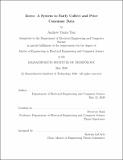Zorro : a system to fairly collect and price consumer data
Author(s)
Tsai, Andrew Yunta.
Download1193031130-MIT.pdf (4.347Mb)
Alternative title
System to fairly collect and price consumer data
Other Contributors
Massachusetts Institute of Technology. Department of Electrical Engineering and Computer Science.
Advisor
Devavrat Shah.
Terms of use
Metadata
Show full item recordAbstract
Consumers' personal data is essential to the online advertising market. However, for a system that is designed to target users with relevant ads, the ecosystem surrounding the market has major inefficiencies in how it buys and sells user data. Users have no control over the information released about them nor its accuracy, and algorithmic advertisers acquire such data without knowing how much value it provides. Consequently, most display ads on the Internet are irrelevant to the consumers who see them, resulting in an increased propensity to use ad blockers that significantly hamper the online advertising market. This thesis proposes Zorro, a system that fairly collects and prices consumer data. Zorro provides an intuitive definition of the "Value of Data" (VoD) and allows users to make decisions about what data they provide to advertisers. Zorro also provides advertisers with highly granular data about users' interests. To compute a user's VoD, Zorro employs a model agnostic solution in matrix estimation, a promising field in machine learning, and illustrate how it can be used to estimate click-through-rate (CTR) as an example. This VoD definition enables advertisers to gauge the value of their data purchases on a query-by-query basis, where they pay explicitly for data that provides increases in accuracy in estimating CTR. This differs drastically from the status quo of advertisers negotiating inefficient long-term contracts with data providers where the VoD is unclear. Upon implementing Zorro as a Chrome Extension and testing it on real-world ad click datasets, Zorro's CTR estimation has a R² of 0.58, comparable with state-of-the-art results for similar problems in content recommendation. Surprisingly, experiments also show that acquiring user data through Zorro has incremental value in estimating CTR, ranging from 30% to 69% depending on advertiser category. This roughly translates to at least a USD 16 Billion loss in value for advertisers if user data is not provided. We believe that Zorro defines a new generation of double-blind systems in targeted advertising while still maintaining the integrity of user privacy. Zorro is available to install today on the Chrome Web Store.
Description
Thesis: M. Eng., Massachusetts Institute of Technology, Department of Electrical Engineering and Computer Science, May, 2020 Cataloged from the official PDF of thesis. Includes bibliographical references (pages 51-53).
Date issued
2020Department
Massachusetts Institute of Technology. Department of Electrical Engineering and Computer SciencePublisher
Massachusetts Institute of Technology
Keywords
Electrical Engineering and Computer Science.